The shuttle’s drive kicked in, delivering a mild push that Tchicaya succeeded in interpreting as a precipitous dive, rather than a complete inversion of land and sky. He scanned the eye-watering whiteness, hunting for their destination, but the glare was impenetrable. It seemed miraculous to be skimming kilometers above an object that dominated the sky for hundreds of light-years — without being burnt to a cinder, as he would have been this close to the surface of a star — but it was sheer size that made the border visible from afar. Each square kilometer didn’t have to blaze fiercely for the total luminosity to outshine any supernova. Without the usual Doppler shift to boost the light’s power, a pinhole view looking straight at the border would actually have been dimmer, here, by a factor of three, than the equivalent view from any planet he’d visited. What dazzled was the fact that it filled his vision, leaving room for nothing else. On Pachner, for much of the year the border had been partly hidden by daylight, but even when it reached its furthest angle from the sun there’d always been a narrow strip of washed-out darkness left over somewhere on the horizon, with a few pallid stars on which to rest your eyes.
As the drive reversed, he finally spotted the silhouette of the Scribe. He made a mask against the surrounding glare with his hands, and managed to discern some structure. At the top of the machine was a sphere, rainbow iridescent in the light that grazed it. He knew it was embossed with a fine pattern of microjets, trillions of tiny devices capable of firing as few as one or two atoms in any direction. While the Rindler could keep pace with the border well enough simply by cruising, the Scribe’s stylus hovered so close that collisions with interstellar gas, and even the pressure of the borderlight itself, would have ruined the alignment if left uncompensated. Presumably, the visitors' own influence would be well within the machine’s defensive capacities, but to Tchicaya it was both marvelous and comical that their presence could be accommodated — like a calligrapher inscribing Gravitation on the head of a pin, while four fat infants clambered onto the artisan’s shoulders and proceeded to wrestle.
As the shuttle drew nearer, the Scribe’s modest size became apparent; it was smaller than one of the Rindler 's modules, forty or fifty meters across, with the sphere of microjets held out on a boom above a flat deck. The shuttle’s drive made one last perceptible correction before a series of maneuvers too gentle to feel brought them into contact with the deck.
Kadir unstrapped himself, and approached the hatch in the floor of the shuttle. Tchicaya followed him.
"You keep an atmosphere in there?"
Kadir nodded. "People come and go, it’s easiest just to maintain the pressure."
Tchicaya frowned. "I’m never going to get to use this, am I?" He pinched the back of his hand to tug on the near-invisible membrane that he’d sprayed all over his skin; he’d been told it would let his body survive for up to a week in vacuum, and since it took three months to grow a new one, that had seemed like a precaution worth taking. The one thing the suit lacked was reaction mass. If he found himself drifting toward the border, the best thing to do would be to broadcast a final backup and resign himself to an interesting local death.
Kadir said, "I’ll see if I can arrange an opportunity on the way back." The remark was delivered without obvious malice, but it was still hard to know how to take it. Since Tchicaya had allowed Yann to introduce him to the two Preservationists as a fellow partisan, the tension he’d felt had ebbed and flowed, and he was never sure when to expect a bit of good-natured teasing, and when to brace himself for a genuinely chilly rebuff as an enemy of the cause.
Zyfete and Yann joined them as the hatch irised open, revealing a softly lit tunnel lined with handholds. Tchicaya hung back until last, not wanting to block anyone’s progress if he froze. The others all went feetfirst, as if they were descending a ladder, but he felt more secure crawling along the tunnel, imagining himself more or less horizontal. He recalled a playground back on Turaev, a maze of interconnected pipes. When Zyfete glanced up at him and scowled, he poked his tongue out at her and recited a few lines of childish rhyme. In spite of herself, she smiled.
The Scribe’s control room was octagonal, with eight slanted windows facing down toward the border. Judging the distance by eye was difficult, with no texture to the light to set the scale, but Tchicaya guessed he was now floating just five or six meters from the novo-vacuum. He suddenly noticed the beating of his heart, though the rhythm didn’t feel abnormal; it was a shift in his attention, rather than a rush of adrenaline. He wasn’t afraid, but he was acutely aware of his body: the softness and fragility of it, compared to most other things in the world. It was the way he felt when he found himself stranded in the middle of a harsh landscape, insufficiently prepared for its rigors, but not so threatened that he’d simply write off his current incarnation as unsalvageable. It would take a cosmic disaster even larger than Mimosa to rob him of more than a few minutes' memories, but while he inhabited a body he identified with it wholly. He was in a place where a mishap could shred him into something smaller than atoms, and under the circumstances he was more than happy to let instincts predicated on absolute life and death come to the fore and do their best to protect him.
A bank of displays in the center of the room surrounded an octagonal dome, the housing for the stylus. Tchicaya watched as Kadir and Zyfete issued a long series of spoken commands. The lack of automation was almost ritualistic; he glanced inquiringly at Yann, who whispered, "It’s a kind of transparency. There are more sophisticated ways we could monitor each other, but having observers from both sides at every experiment, and controlling everything with words, keeps the proceedings out in the open on one level — while we check the equipment and audit the software with a thousand different kinds of high-powered tools, offstage."
"That’s so much like Earth-era diplomacy it’s depressing."
Yann smiled. "I knew your arcane knowledge would come in handy here."
Tchicaya snorted. "Don’t look at me to spout Machiavelli. If you want that shit, go and dig up an ancient."
"Oh, I’m expecting anachronauts to arrive at the Rindler any day now — preceded by a few megatonnes of fusion by-products — and announce that they’ve come to save the universe."
"Any day, or any millennium." It was an eerie prospect to contemplate. Scattered remnants of pre-Qusp civilization, twenty thousand or so years old, still chugged between the stars in spluttering contraptions, spewing spent fuel and taking thousands of years for every journey. Tchicaya had never met any of the ancients himself, but his father had encountered one group, which had visited Turaev long before he was born. None had traveled more than eighty light-years from Earth, so as yet they hadn’t been endangered by the novo-vacuum, but unless the Preservationists triumphed, within decades the anachronauts would face a decision between adopting some of the hated new technologies and annihilation.
Kadir shot them a disapproving look, as if their chattering meant they weren’t taking their monitoring role seriously. Tchicaya had full-sensory recall, regardless of conscious attention, and Yann would undoubtedly boast something even fancier, but he disciplined himself and fell silent.
Zyfete was describing a sequence of particles to be emitted by the stylus. The disaster at Mimosa had provided at least one compensatory boon: experiments in quantum gravity had become far easier to perform. The border was only a few Planck lengths deep, providing experimenters with a tool compared to which an atomic blade would look wider than a planetary system. While the highest-energy particles the Scribe could create were laughably blunt instruments, the border itself could be made to carve them into shrapnel vastly more effective than each innocuous whole. When the stylus fired a coherent beam of mesons at the border, the razor wire of disrupted graphs sliced fragments of their own surreal dimensions from the knot of virtual quarks and gluons making up each meson, and it was possible to exploit coherence effects to make some of these fragments act in unison to modify the border itself. Natural sources of noise had no prospect of accidentally triggering the same effect, so the kind of exorbitant shielding the Quietener had used was no longer required.
Читать дальше
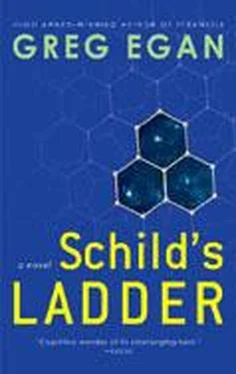
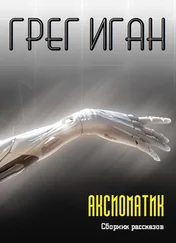
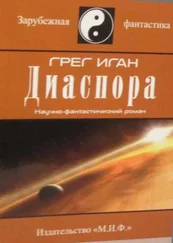
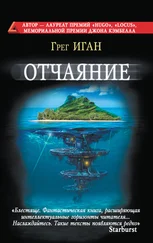
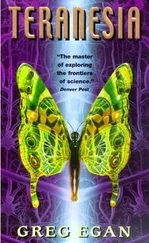
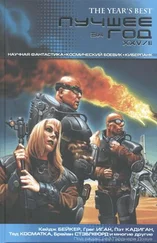
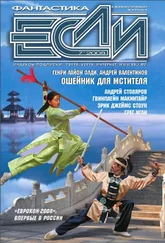

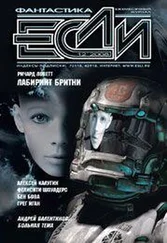
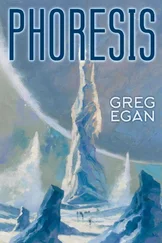
![Грег Иган - Рассказы [компиляция]](/books/419837/greg-igan-rasskazy-kompilyaciya-thumb.webp)
